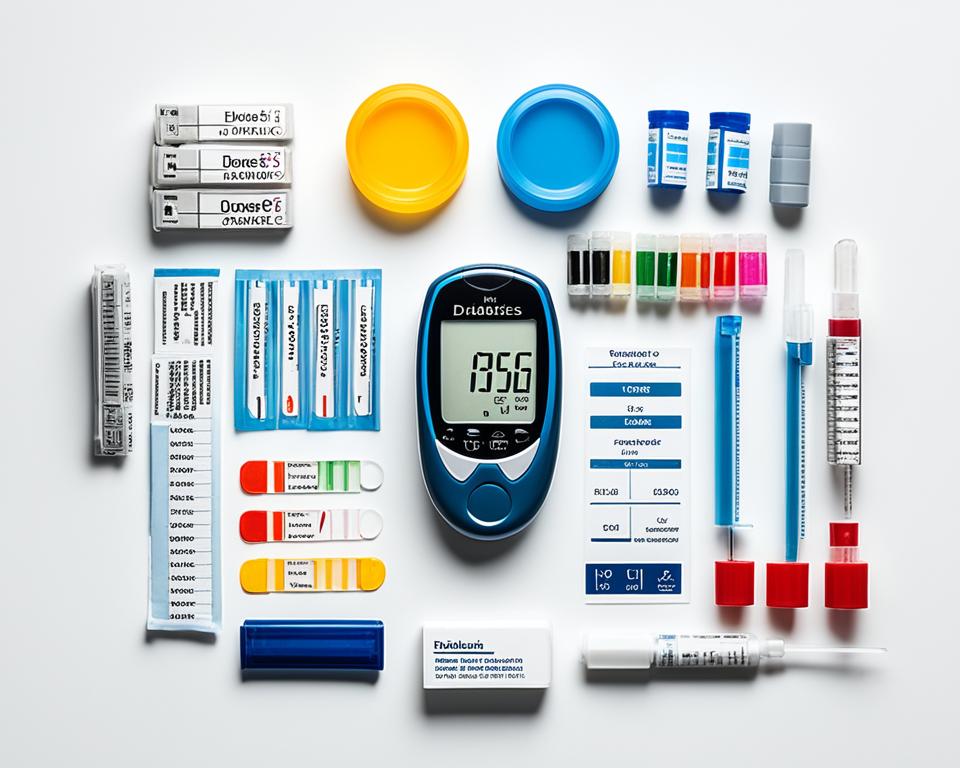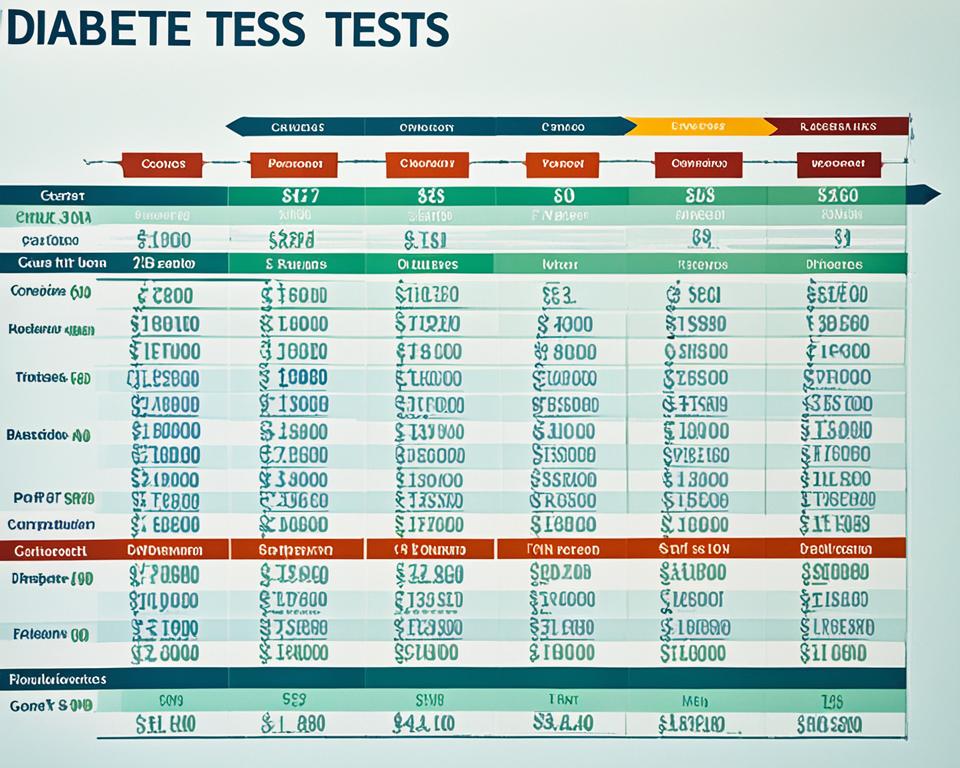How Much Does a Diabetes Test Cost? | Average Pricing

The cost of diabetes testing can vary significantly depending on the type of test, your location, insurance coverage, and other factors. In this article, we’ll explore the average pricing for various diabetes screening tests, including fasting blood glucose, oral glucose tolerance, hemoglobin A1C, and self-monitoring blood glucose. We’ll also discuss the impact of insurance and strategies to make diabetes testing more affordable.
Read interesting things at : intarajyuku
Key Takeaways
- The cost of diabetes tests can vary significantly based on the type of test, your location, and insurance coverage.
- Fasting blood glucose, oral glucose tolerance, and hemoglobin A1C tests can range from $25 to $200 or more, depending on your insurance and provider.
- Self-monitoring of blood glucose through test strips and meters can add ongoing expenses, but patient assistance programs may help reduce these costs.
- Understanding the impact of insurance and exploring cost-saving strategies can make diabetes testing more affordable.
- Regular preventive care and screening for diabetes can help detect the condition early and manage healthcare expenses.
Understanding Diabetes Testing Costs
To fully comprehend the expenses associated with diabetes testing, it’s crucial to familiarize oneself with the various types of tests available and the factors that can influence their prices. Diabetes screening can encompass a range of procedures, including fasting blood glucose, oral glucose tolerance, hemoglobin A1C, and self-monitoring blood glucose. The cost of diabetes test can be considerably impacted by factors such as insurance coverage, the specific healthcare provider or laboratory utilized, and geographical location.
Types of Diabetes Tests
Fasting blood glucose, oral glucose tolerance, hemoglobin A1C, and self-monitoring blood glucose are the primary diabetes testing prices that individuals with diabetes may encounter. Each of these tests serves a distinct purpose in the diagnosis, management, and monitoring of the condition, and the associated costs of glucose monitoring can vary accordingly.
Factors Affecting Test Prices
The blood sugar test expenses faced by patients can be influenced by a multitude of factors, including the presence or absence of insurance coverage, the specific healthcare facility or laboratory where the test is performed, and the patient’s geographic location. Understanding these diabetic screening fees and diabetes diagnostic costs is essential for individuals to effectively budget and plan for their price of diabetes checks and glucose level testing charges.
Fasting Blood Glucose Test Costs
The fasting blood glucose test is a widely used diagnostic tool for detecting diabetes. This simple test measures the amount of glucose in your blood after you have not eaten for at least 8 hours. Understanding the average pricing for this essential diabetes screening can help patients better manage their healthcare expenses.
Average Pricing for Uninsured Patients
For uninsured patients, the cost of a fasting blood glucose test can range from $25 to $75. This price can vary depending on the healthcare provider, the laboratory performing the test, and your geographic location. Factors such as the glucose monitoring costs and blood sugar test expenses in your area can influence the final out-of-pocket cost.
Insurance Coverage and Copays
Fortunately, many health insurance plans cover the cost of fasting blood glucose tests as part of routine preventive care. Patients with insurance coverage may only be responsible for a copay or coinsurance amount, which can significantly reduce the diabetic screening fees and diabetes diagnostic costs. Checking with your insurance provider to understand your specific coverage can help you better price of diabetes checks and glucose level testing charges.
Oral Glucose Tolerance Test Expenses
The oral glucose tolerance test is a crucial diagnostic tool used to screen for diabetes. This comprehensive test involves drinking a glucose solution and then having your blood glucose levels measured at various intervals over a period of time. The cost of an oral glucose tolerance test can range from $50 to $200, depending on the specific procedures and the number of blood draws required.
Preparation and Procedure
Prior to the oral glucose tolerance test, patients are typically instructed to fast for 8-12 hours. This helps ensure accurate measurements of blood glucose levels. Once the fasting period is complete, the patient will drink a glucose solution, and their blood will be drawn at regular intervals, often every 30 minutes to an hour, to monitor how their body is processing the glucose. This process can take up to 3 hours, contributing to the overall cost of the test.
The specific expenses associated with an oral glucose tolerance test can vary depending on factors such as the healthcare provider, laboratory or clinic performing the test, and the patient’s insurance coverage. Uninsured individuals or those with high-deductible health plans may face higher out-of-pocket costs for this type of diabetes screening.
| Metric | Average Cost Range |
|---|---|
| Oral Glucose Tolerance Test | $50 – $200 |
Understanding the potential costs of an oral glucose tolerance test is essential for individuals who may need to undergo this screening. By being informed about the expenses involved, patients can better plan and budget for their diabetes care, ensuring they have access to the necessary diagnostic tools to manage their condition effectively.
Hemoglobin A1C Test Pricing
The hemoglobin A1C test is a vital tool for monitoring and managing diabetes. This test measures your average blood glucose levels over the past 2-3 months, providing a comprehensive view of your diabetes control. Understanding the role of the A1C test in diabetes management can help you budget for this important diagnostic tool.
Role in Diabetes Management
The hemoglobin A1C test is a key metric for healthcare providers to assess how well an individual with diabetes is managing their condition. By measuring the average amount of glucose that has attached to the hemoglobin in the blood, the A1C test gives a reliable indication of long-term blood sugar levels. This information is crucial for guiding treatment decisions, adjusting medications, and monitoring the effectiveness of diabetes management strategies.
Cost Variations by Location
The cost of an A1C test can vary widely, ranging from as low as $15 to as high as $100 or more, depending on your geographic location and whether you have insurance coverage. Factors such as the laboratory or clinic performing the test, the specific procedures involved, and the negotiated rates with your healthcare provider can all impact the final cost. By researching the average diabetes testing prices in your area, you can better plan and budget for this important aspect of your diabetes care.
Regularly monitoring your glucose monitoring costs and blood sugar test expenses is crucial for managing the overall cost of your diabetes care. By understanding the role of the A1C test and the potential diabetic screening fees, you can make informed decisions about your healthcare and ensure that you receive the necessary monitoring and management to maintain your health.
Whether you have diabetes diagnostic costs covered by insurance or are paying out-of-pocket, staying informed about the price of diabetes checks and glucose level testing charges can help you manage your healthcare expenses and ensure you receive the necessary care. By exploring options for diabetic test affordability and understanding the potential out-of-pocket diabetes test outlays, you can take control of your diabetes management and maintain your overall health and well-being.
how much diabetes test cost
The cost of a diabetes test can vary widely depending on the type of test, your insurance coverage, and the healthcare provider you visit. Factors such as geographic location, the laboratory or clinic performing the test, and whether you have a high-deductible health plan can also impact the overall cost of diabetes testing.
To better understand the diabetes testing prices, let’s explore the average pricing for some common tests:
| Test Type | Average Cost (Uninsured) | Cost with Insurance |
|---|---|---|
| Fasting Blood Glucose | $25 – $75 | Typically covered with a small copay |
| Oral Glucose Tolerance | $50 – $200 | Varies based on plan coverage |
| Hemoglobin A1C | $15 – $100 | Often covered as part of preventive care |
Understanding the glucose monitoring costs and blood sugar test expenses associated with different diabetes tests can help you manage your healthcare expenses and make informed decisions about your diabetic screening fees and diabetes diagnostic costs.
By exploring the price of diabetes checks and glucose level testing charges, you can also identify strategies to make diabetic test affordability and out-of-pocket diabetes test outlays more manageable.
Self-Monitoring Blood Glucose Costs
Self-monitoring of blood glucose is an essential part of diabetes management for many patients. The costs associated with this crucial aspect of diabetes care include the expense of test strips, glucose meters, and lancets. Understanding these ongoing expenses is crucial for budgeting and managing the overall cost of diabetes care.
Test Strip Expenses
The cost of diabetes test strips can range from $0.50 to $1 per strip, making them a significant ongoing expense for those with diabetes. The number of test strips needed can vary depending on individual needs and the recommendations of your healthcare provider, but the cost can quickly add up, especially for those without insurance coverage or with high-deductible health plans.
Meter and Lancet Costs
In addition to test strips, individuals with diabetes must also factor in the cost of the glucose meter itself. These devices can range from $20 to $100, depending on the features and brand. Lancets, used to draw the blood sample for testing, are generally more affordable, with a pack of 100 lancets typically costing around $10. While the upfront cost of the meter may be higher, the ongoing expenses of test strips and lancets can have a more significant impact on the overall cost of self-monitoring blood glucose.
Diabetes Testing at Labs and Clinics
Many diabetes tests are performed at laboratories or healthcare clinics. The cost of these tests can vary depending on the provider, your location, and your insurance coverage. Uninsured patients or those with high-deductible health plans may face higher out-of-pocket costs for diabetes testing done at labs and clinics.
Out-of-Pocket Costs
Understanding the potential expenses and exploring options for cost-saving strategies can help make diabetes testing more affordable. Patients should be aware of the prices charged by different providers and compare glucose monitoring costs, blood sugar test expenses, and diabetic screening fees to find the most cost-effective solution for their diabetes diagnostic costs and price of diabetes checks.
| Test | Average Cost (Uninsured) | Average Cost (Insured) |
|---|---|---|
| Fasting Blood Glucose | $25 – $75 | $0 – $20 (with copay) |
| Oral Glucose Tolerance | $50 – $200 | $20 – $100 (with copay) |
| Hemoglobin A1C | $15 – $100 | $0 – $50 (with copay) |
By understanding the diabetic test affordability and out-of-pocket diabetes test outlays, individuals can make informed decisions about their glucose level testing charges and ensure they receive the necessary diabetes diagnostic services.
Impact of Insurance Coverage
Insurance coverage can have a significant impact on the cost of diabetes testing. Insurers often negotiate discounted rates with healthcare providers, which can result in lower costs for insured patients. This can make diabetes testing prices more affordable for those with comprehensive insurance plans.
Negotiated Rates
When healthcare providers and insurance companies work together to establish negotiated rates for various medical services, including glucose monitoring costs and blood sugar test expenses, the out-of-pocket costs for insured patients can be significantly lower than the standard retail prices. This negotiation process helps to ensure that diabetic screening fees and diabetes diagnostic costs are more manageable for those with insurance coverage.
High-Deductible Health Plans
However, not all insurance plans are created equal. Patients with high-deductible health plans may face higher out-of-pocket costs for diabetes tests until they have met their annual deductible. This can make the price of diabetes checks and glucose level testing charges more challenging to manage, especially for those with diabetic test affordability concerns.
Understanding how insurance coverage affects the cost of diabetes testing is crucial for patients to plan and budget for their healthcare needs effectively. By exploring the impact of negotiated rates and high-deductible health plans, individuals with diabetes can make informed decisions about their testing and treatment options.
Cost-Saving Strategies for Diabetes Testing
While the cost of diabetes testing can vary, there are several strategies patients can utilize to make these essential procedures more affordable. By exploring cost-saving options, individuals with diabetes can ensure they receive the necessary screening and monitoring without adding undue financial burden.
Patient Assistance Programs
Many pharmaceutical and medical device companies offer patient assistance programs that can provide discounts or even free supplies for those who qualify. These programs are designed to help make diabetes testing and management more accessible, particularly for uninsured or underinsured individuals. Researching and applying for these assistance programs can significantly reduce the out-of-pocket expenses associated with glucose monitoring, test strips, and other diabetes-related products.
Online Retailers and Discounts
In addition to patient assistance programs, shopping for diabetes testing supplies through online retailers and discount programs can also lead to substantial cost savings. Websites and apps that specialize in diabetes-related products often offer competitive pricing, as well as promotional discounts and subscription services that can help lower the long-term costs of glucose monitoring costs, blood sugar test expenses, and diabetic test affordability. Exploring these digital options can help patients find the most affordable solutions for their diabetes testing prices and glucose level testing charges.

Preventive Care and Screening Costs
Preventive care and regular diabetes screenings can play a crucial role in detecting the condition early and preventing or delaying the onset of complications. Many health insurance plans cover the cost of diabetes screening tests, such as fasting blood glucose and hemoglobin A1C, as part of routine preventive care. Understanding your insurance coverage and taking advantage of these preventive services can help manage the overall cost of diabetes care.
Regular diabetes screening tests, including the glucose monitoring costs and blood sugar test expenses, are essential for monitoring and managing the condition. Diabetic screening fees and diabetes diagnostic costs may be covered by your health insurance, depending on your plan’s benefits. Staying informed about the price of diabetes checks and glucose level testing charges can help you maximize your diabetic test affordability and minimize your out-of-pocket diabetes test outlays.
By understanding the importance of preventive care and taking advantage of available screening services, individuals with diabetes can proactively manage their condition and reduce the overall healthcare expenses associated with the disease. Exploring your insurance coverage and strategies to make diabetes testing more affordable can be a valuable step in prioritizing your long-term health and well-being.
Gestational Diabetes Testing Expenses
Pregnant women may be required to undergo additional diabetes testing, such as gestational diabetes screening. The cost of these tests can vary, but they are often covered by health insurance plans. Understanding the specific requirements and costs associated with gestational diabetes testing can help expectant mothers budget for this important aspect of prenatal care.
Gestational diabetes is a form of high blood sugar that develops during pregnancy and can pose risks to both the mother and the baby. As such, screening for gestational diabetes is a standard part of prenatal care. The tests used to diagnose gestational diabetes typically include the glucose challenge test and the oral glucose tolerance test, both of which help evaluate the body’s ability to process glucose.
The cost of these tests can range from $50 to $200, depending on the specific laboratory or healthcare provider, the number of tests required, and the patient’s insurance coverage. Many health insurance plans, including Medicaid and private insurance, cover the cost of gestational diabetes screening as part of routine prenatal care, reducing the out-of-pocket expenses for expectant mothers.
By understanding the potential costs and exploring the coverage options available through their insurance, pregnant women can better prepare and budget for the expenses associated with gestational diabetes testing. This knowledge can help ensure they receive the necessary screenings and manage this important aspect of their prenatal health.
Comparing Diabetes Test Costs Across Providers
When it comes to the cost of diabetes testing, it’s important to understand that prices can vary significantly depending on the healthcare provider you visit. To find the most affordable option, patients should take the time to compare prices across different laboratories, clinics, and other healthcare facilities in their area.
Transparency and Price Shopping
Transparency in pricing is crucial for individuals with diabetes who are trying to manage their healthcare expenses. By having access to clear and upfront information about the cost of various diabetes tests, patients can “price shop” and make informed decisions about where to receive their care. This level of price transparency not only empowers patients but also encourages healthcare providers to keep their costs competitive and reasonable.
Comparing the diabetes testing prices, glucose monitoring costs, and blood sugar test expenses across different providers can help patients identify the most affordable options for their diabetic screening fees and diabetes diagnostic costs. This process allows them to make well-informed choices about the price of diabetes checks and glucose level testing charges, ultimately ensuring they receive the necessary diabetic test affordability and can manage their out-of-pocket diabetes test outlays.

Emerging Diabetes Testing Technologies
As the landscape of diabetes care continues to evolve, new technologies are emerging that are transforming the way patients monitor and manage their condition. One such innovative approach is the use of continuous glucose monitoring (CGM) systems. These advanced devices provide real-time data on an individual’s glucose levels, offering valuable insights that can help improve diabetes management and overall health outcomes.
Continuous Glucose Monitoring Costs
While the potential benefits of CGM systems are significant, the costs associated with this emerging technology can be a significant factor for patients. Depending on the specific device and level of insurance coverage, the monthly expenses for a CGM system can range from $50 to $500 or more. This wide range in pricing underscores the importance of understanding the cost implications and exploring options to make these technologies more accessible and affordable for individuals with diabetes.
By staying informed about the costs of CGM systems and other emerging diabetes testing technologies, patients and their healthcare providers can make informed decisions that align with their individual needs and financial resources. Careful consideration of these factors can help ensure that everyone with diabetes has access to the tools and support they need to effectively manage their condition and achieve the best possible health outcomes.
Comprehensive Diabetes Care Costs
The cost of diabetes care extends beyond just the testing. Treatment, medication, and ongoing management of the condition can also contribute significantly to the overall healthcare expenses for individuals with diabetes. From insulin and oral medications to medical devices and lifestyle interventions, the comprehensive costs of diabetes care can be substantial. Understanding the full scope of these expenses can help patients and their families plan and budget for their healthcare needs.
Beyond Testing: Treatment and Management
Beyond the costs of diabetes testing, individuals with the condition often face additional expenses related to treatment and ongoing management. This can include the cost of insulin, oral medications, medical devices like glucose meters and continuous glucose monitoring (CGM) systems, as well as the expenses associated with lifestyle interventions such as nutritional counseling and physical therapy. Collectively, these expenses can add up quickly, making it crucial for patients to understand the comprehensive costs of diabetes care.
For example, the average cost of insulin in the United States can range from $100 to $400 or more per month, depending on the type of insulin and the patient’s insurance coverage. Oral medications for diabetes, such as metformin, can cost $10 to $100 or more per month. Medical devices like glucose meters and CGM systems can range from $20 to $500 or more per month, with ongoing expenses for test strips and sensors. Lifestyle interventions, such as nutritional counseling and physical therapy, can also contribute to the overall cost of diabetes management.
Understanding the comprehensive costs of diabetes care, including treatment, medication, and ongoing management, can help patients and their families better prepare for and manage their healthcare expenses. By staying informed and exploring cost-saving strategies, individuals with diabetes can ensure they receive the necessary care and support to maintain their health and well-being.
Conclusion
In conclusion, the cost of diabetes testing can vary widely depending on the type of test, your insurance coverage, and the healthcare provider you visit. By understanding the average pricing for different diabetes tests, the impact of insurance, and strategies to reduce costs, individuals with diabetes can better manage their healthcare expenses and ensure they receive the necessary screening and monitoring to maintain their health.
Staying informed and exploring all available options can help make diabetes testing more affordable and accessible. From understanding the costs of fasting blood glucose, oral glucose tolerance, and hemoglobin A1C tests, to leveraging patient assistance programs and taking advantage of preventive care coverage, there are numerous ways to optimize the affordability of diabetes testing. By proactively addressing the financial aspects of diabetes care, individuals can focus on maintaining their overall health and well-being.
As the landscape of diabetes testing continues to evolve, with the emergence of innovative technologies like continuous glucose monitoring, it is crucial for patients and healthcare providers to stay informed about the costs and coverage associated with these advancements. By understanding the comprehensive expenses of diabetes care, individuals can make informed decisions and develop effective strategies to manage their condition while minimizing the financial burden.



Leave a Comment